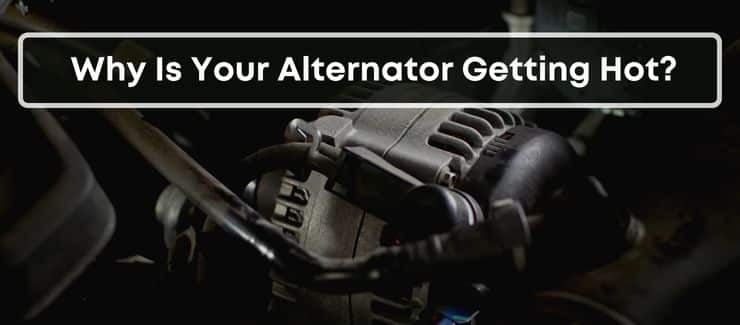The alternator is one of the most overlooked components in any vehicle.
As it’s located in the engine bay, many car owners don’t pay much attention to it when their vehicle is running fine.
However, if you’ve ever diagnosed an issue in your car, you’ll know that it’s often related to the electrical system – or the alternator, to be precise.
One of those issues is the alternator getting hot.
Based on my experience, the alternator overheats mainly due to overload, battery issues, faulty internal components, inadequate ventilation, hot ambient temperature, etc.
In this post, we’ll discuss why these issues cause the alternator to get heated and how you can fix them.
How Hot Should An Alternator Get?
First, we should talk about the normal temperature for a working alternator. That’s because many car owners get overly conscious when their alternator is too hot to touch.
They don’t realize that the alternator powers all the vehicle components by converting the mechanical energy to electrical energy. Therefore, this conversion will have some heat produced as a by-product.
In normal circumstances, alternators can get 120-140℉ hot when working – with some models going up to 180℉. This temperature will be ‘too hot to touch’ for most people, but there’s no need to worry if it’s working fine.
Therefore, you should buy a thermometer and use it to confirm whether the temperature is outside the normal range for your alternator or not.
Alternator Overheating Symptoms
Next, we’ll discuss some common signs associated with an overheating alternator.
As the alternator is located inside the engine bay, there are slim chances that you’ll check its temperature frequently on your own.
Instead, you’ll have to rely on the symptoms listed below, such as:
- Battery/charging system warning light on the dashboard screen
- Burning rubber smell coming from the engine area
- Flickering headlights/interior lights
- Smoke coming out of the alternator or surrounding area.
- Car stalling frequently
- Squealing noises when the car accelerates
Many of these signs are also associated with other problems. But if you’re experiencing 3-4 of them simultaneously, it usually indicates an overheating alternator.
9 Reasons Why Your Alternator is Getting Hot
1. Excessive Electric Overload
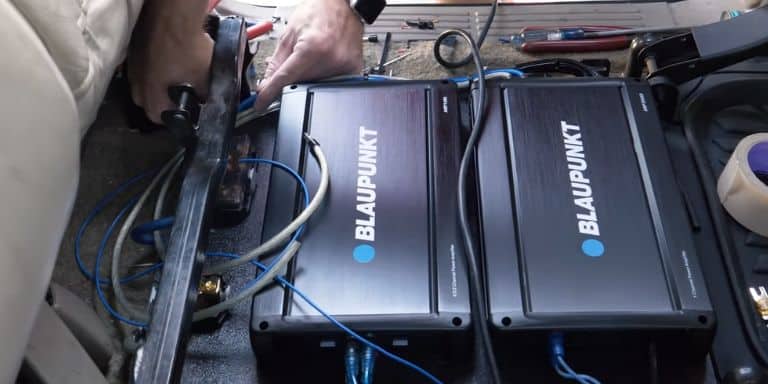
The most common reason for an overheating alternator is the electric load.
I have seen many car owners installing different aftermarket components without realizing its effects on the alternator.
That’s even more prevalent among car audio installers as they’d try to beef up their audio system by putting multiple 4/5-channel amps without considering the load those amps will put on the alternator.
As a result, the alternator finds it hard to keep up with the load, and you get different issues, such as speaker sound cutting at high volume levels, distorted bass, and dimming headlights.
It happens because the power demand by the amplifiers is highest during those moments.
Therefore, if you’ve recently installed/upgraded a component inside your vehicle and the alternator has been overheating since then, it indicates that the installed component is too powerful for the alternator.
To fix this issue, upgrade the alternator and its wires to match the extra load.
2. Battery Issues
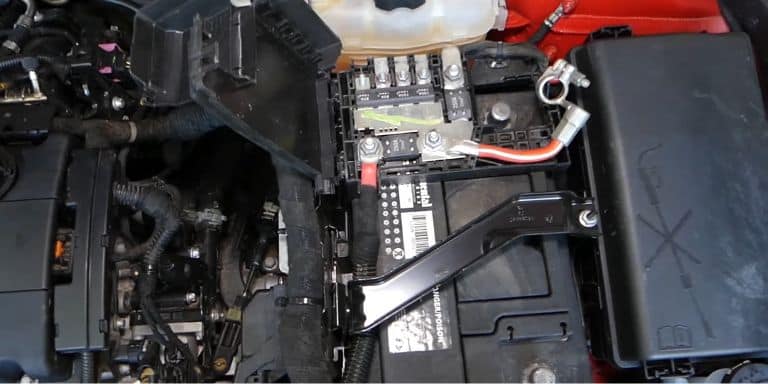
The next thing we’ll check is the battery.
But how is an overheated alternator related to a bad battery?
To understand that, we’ll first have to discuss how the car’s electrical system works.
When we turn the ignition key (or press the start button), the battery sends a powerful current jolt to run the starter motor. The starter motor then engages with the flywheel to rotate the crankshaft and start the engine.
As the crankshaft is connected to the alternator through the serpentine belt, its rotation causes the alternator to start running.
After that, the alternator converts its mechanical energy to electrical energy and powers all the components inside your vehicle. It also powers the battery, as the latter lost a good chunk of power during the ignition.
Therefore, if a battery fails, the alternator will have to work harder to keep it charged constantly. And this overwork will make the alternator hotter than usual.
To confirm whether that’s the case, you’ll have to test the battery with a multimeter.
Generally, a good battery should give you a 12.6V reading when the engine is off. If it’s below the 12.2V mark, replace the battery or inspect its terminals.
That’s because corroded terminals can increase the resistance between the battery and alternator, making the latter work harder to give the same output. If that is the case with your battery, clean the terminals and see if anything improves.
Another thing you can check is the gauge of the battery cables. The gauge determines how much current can pass through a wire.
If you’ve recently upgraded your car battery and have been getting an overheated alternator since then, the culprit can be the battery cables cause their gauge is too low for the new battery.
Lastly, inspect the battery ground connection.
Like corroded terminals, a bad battery ground connection can increase the resistance in the vehicle’s electrical system, resulting in the alternator overheating due to extra load.
When checking the ground spot, ensure the connection is clean, secure, corrosion-free, and has no paint.
3. Stretched Serpentine Belt
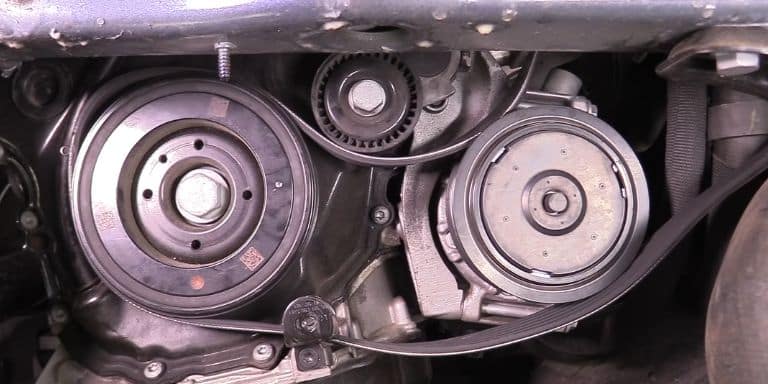
As mentioned earlier, the serpentine belt connects the alternator to the crankshaft. This belt can get too stretched over time due to excessive load, aging, defective tensioner, etc., resulting in loose tension.
This loose tension can cause belt slippage, resulting in the alternator not running at the required speed and producing lower power output. The lower output, in turn, can cause the alternator to work harder, resulting in more heat production.
In many instances, the slippage also creates friction between the belt and the pulley, resulting in heat buildup in the surrounding area.
Therefore, if you get a rubber-burning smell from the engine area and the alternator is overheating, it indicates that the serpentine belt needs to be readjusted or replaced.
You have to be careful when readjusting the belt tension, as an overly tight belt can also place undue stress on the alternator’s components.
4. Bad Voltage Regulator
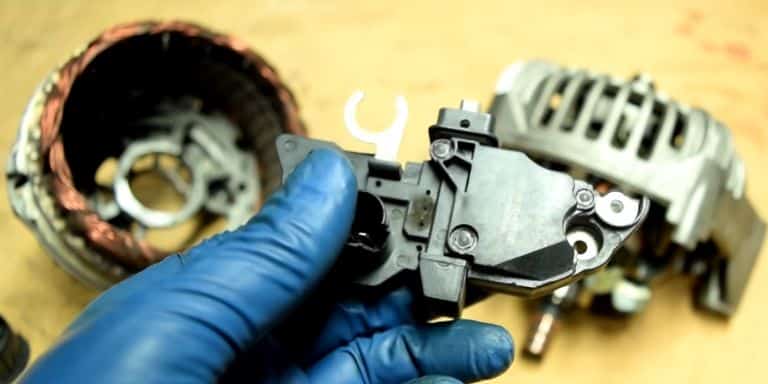
The voltage regulator is a component that controls the output voltage of an alternator.
When it detects the voltage demand of the vehicle systems to be higher than the alternator output, it instructs the alternator to work harder and match the load.
On the other hand, if the regulator detects that the alternator output is matching the voltage, it signals the alternator to reduce its output.
If the voltage regulator is malfunctioning, it can instruct the alternator to keep working hard even when there’s no such demand, resulting in the alternator overcharging the battery and overheating itself.
You’ll need to test the alternator with a multimeter to confirm whether that’s the case.
If you see a voltage reading higher than the normal range, it indicates a malfunctioning voltage regulator.
5. Worn-Out Bearings
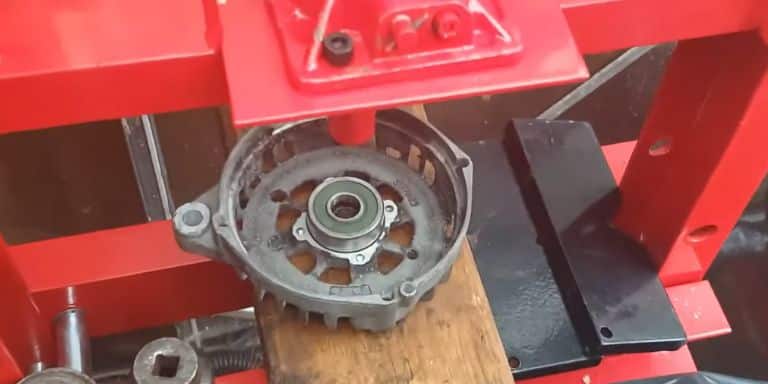
This issue occurs more often when the alternator is a few years old.
The alternator has internal bearings supporting the rotor, allowing it to rotate and produce electricity.
When these bearings wear out, their ability to reduce friction diminishes, resulting in the alternator producing extra heat. This extra heat not only reduces the alternator efficiency but also accelerates the wear and tear of other internal components, such as the diodes and voltage regulator.
If you hear whining or squealing sounds from the alternator, it usually indicates that the bearings are damaged.
As for the fix, you’ll need a professional mechanic to inspect the alternator and replace the bearings. This process is a little too complex for DIY, requiring disassembling and reassembling the alternator.
Therefore, I won’t recommend you do it by yourself.
6. Malfunctioning Diodes
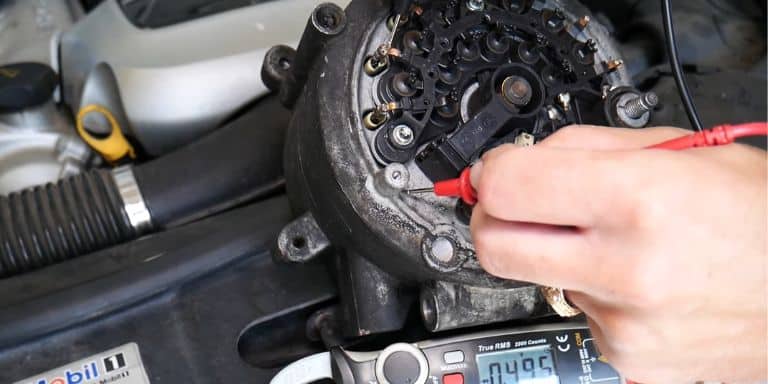
If your alternator is hot even when the car is off, the problem is with rectifier diodes.
These diodes act like one-way valves (by blocking the flow of AC in the reverse direction) to convert the AC current produced by the alternator into the DC current that is used by different car systems.
If one or more of these rectifiers fails, the AC current will back-feed into the alternator.
This back-feeding will result in extra load as the alternator will draw power from the battery. And the additional load will generate extra heat within the alternator’s components, causing it to get hotter.
To confirm whether these diodes are working or not, you’ll need to test them with a multimeter.
Here’s a rough overview of this process:
- Connect the black multimeter lead to the ‘COM’ port and connect the red multimeter lead to the ‘V Ω mA‘ port.
- Set the multimeter to diode mode.
- Connect the red probe to the alternator’s top surface.
- Connect the black probe to the positive terminal/stud on the backside of the alternator.
- The diodes work fine if the reading is around the 0.5V mark (or 0.4-0.7, depending on your alternator).
- If there’s no reading or it’s lower than the normal range, at least one of the diodes is not working.
- In such a case, you’ll have to test each diode individually by placing the black probe on the diode and the red probe on the alternator surface (as shown in the picture above).
- If any of these diodes don’t give a reading, replace it because it’s damaged.
For more info, watch the video below:
7. Inadequate Ventilation
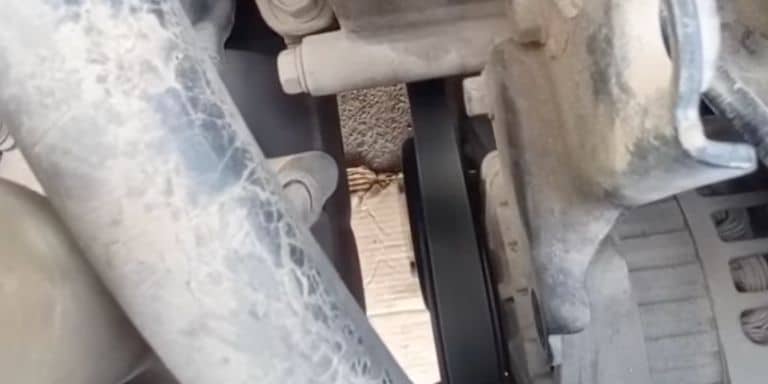
Sometimes, the alternator has no problem but can still overheat due to poor cooling or ventilation.
There are two main things you need to check in this regard.
The first one is the alternator vents. These vents are present on both the front and back of the alternator and help dissipate the heat. If they get blocked due to dirt or debris, the hot air will not transfer out of the alternator and it’ll remain overheated.
The same thing is true for the alternator fan. If this built-in fan stops rotating, the heat produced by the moving parts of the alternator will not go away, and it’ll get overheat pretty soon.
To fix these issues, you’ll need to repair/replace the cooling fan if it’s not working and keep the engine compartment clean (to improve airflow).
8. High Ambient Weather
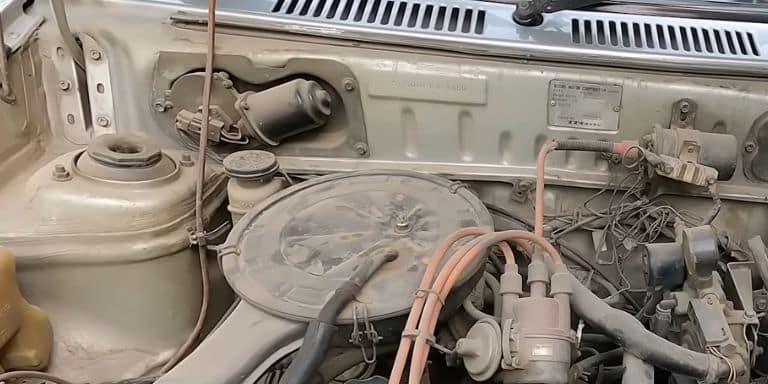
The other thing that can increase the temperature of a fully working alternator is the higher ambient temperature.
In normal circumstances, the alternator fan blows away the hot air and replaces it with cooler air from the surrounding atmosphere to keep the temperature level in check.
However, if the ambient temperature is higher, the surrounding air from the atmosphere will not be much cooler than the hot air coming out of the alternator – resulting in the alternator temperature not going down.
If your alternator gets overheated only during hot summer days, it indicates that it’s working fine and only overheats due to weather conditions.
In such a situation, the only solutions you can try are reducing the alternator load (by turning off the aftermarket amplifier/sub, for example) or parking your vehicle in a shaded area.
9. Aging Alternator
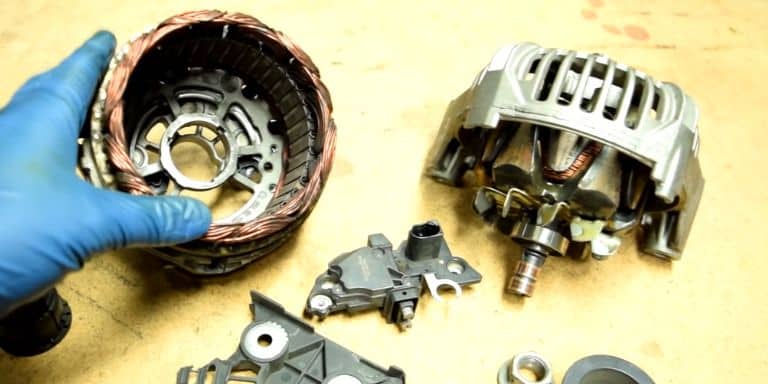
If you’ve read all the conditions mentioned above and none of them fits your criteria, your alternator is most probably overheating due to aging.
Like other car components, the alternator can age due to wear and tear. This aging causes the alternator to have a reduced efficiency, which can lead to overheating.
Frequently Asked Questions
Why Is My Alternator Getting Hot With The Engine Off?
If your alternator is getting hot while the engine is off, it usually indicates a failing rectifier diode in the alternator.
Does Heat Affect The Alternator?
Yes, the heat can reduce the alternator’s efficiency, meaning it will have to work harder to produce the same output.
Can A Bad Alternator Catch Fire?
Although it’s rare, a bad alternator can overheat when charging a dead battery, resulting in the battery exploding and the car catching fire.
How To Fix An Overheating Alternator?
To fix an overheating alternator, you’ll first need to find the reason behind its overheating. As it can get hot for various reasons, there’s no single fix to stop the alternator from overheating.
Can A Bad Battery Burn Out An Alternator?
Yes, a bad battery can cause an alternator to work harder than usual and damage it in the long run.
Can An Alternator Burn Out A Battery?
An alternator cannot power your vehicle systems if it is not working. As a result, the battery steps in and powers those systems until it’s fully drained – leaving you with a dead battery.
What Does A Burning Alternator Smell Like?
If an alternator smells like burning rubber, it indicates its serpentine belt is likely experiencing excessive friction or overheating.
